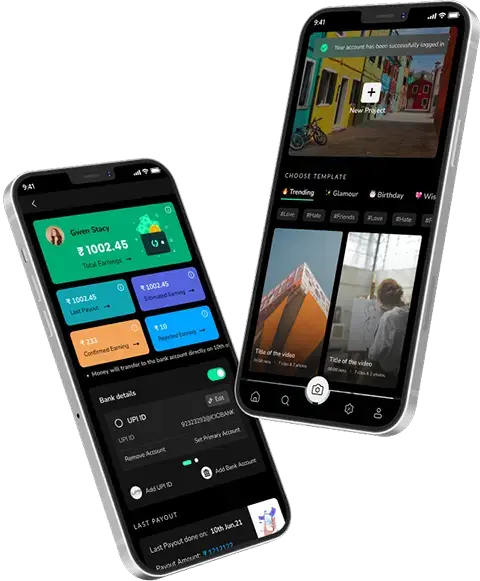27 Aug 2024
Blockchain Technology Beyond Cryptocurrencies: Exploring Its Versatile Applications
Shaun Bell
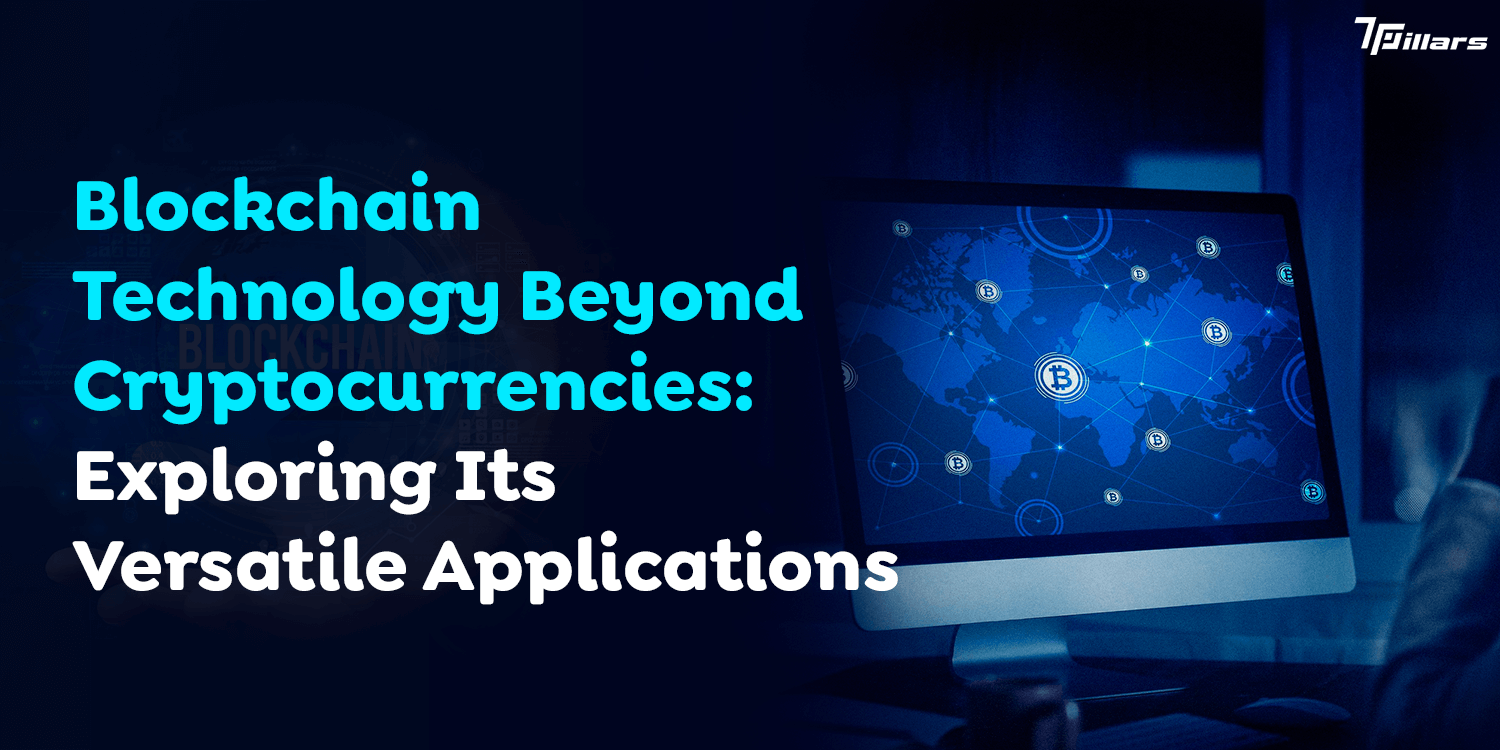
The ever-changing technological realm has given birth to several brilliant technologies and features to make life convenient for individuals, with the recently discovered Blockchain technology being one of them that has successfully knocked out the pre-existing technologies offering similar benefits with ease.
Over time, Blockchain Technology has created a buzz amongst people by offering brilliant transparency and security to their transactions, thus gaining users’ trust and erasing the terrible taste of fraud to create a worry and hassle-free environment for regular transactions.
The best part about the recently discovered technology is that it isn’t limited to offering transparency and security to individual transactions but extends to providing immutability, decentralization, traceability, and efficiency. After the success of cryptocurrencies globally, blockchain technology started associating with digital currencies in users’ minds due to the security it provided to them and their data during digital transactions.
As we step into the digital transformation era, Blockchain technology will be that game-changing force which reshapes industries with its sterling features. Imagine a world wherein every transaction is transparent, secure, and immutable—welcome to a blockchain world.
First used to underpin Bitcoin and other cryptocurrencies, it acts in many industries today.
It is becoming a game-changer in any sector where supply chain management and healthcare are prevalent. Due to its very makeup, blockchain is decentralized—held not by one single entity but distributed across a network of nodes. It makes it close to impossible to tamper with. This characteristic is transforming industries with better transparency and accountability.
Before 2009, no one would have imagined the security provided by the innovative and recently launched blockchain security provides to individuals’ sensitive data during digital transactions. Apart from industries it was initially associated with, like cryptocurrencies and bitcoin, blockchain has shown tremendous potential in other sectors like healthcare and real estate by making waves to attract more people to integrate this technology into their everyday lives.
What Is Blockchain Technology?
Now, for the curious, unaware souls living under the rock wondering what blockchain technology is, let’s start with a basic definition of brilliant and innovative technology. A blockchain is a dispersed record of growing lists of entries, also known as blocks, that are securely linked through cryptographic hashes.
Each block contains a timestamp, data describing transactions—usually in a Merkle tree format where the data nodes appear as leaves—and a cryptographic hash of the previous block. Every new block, carrying information about the prior block, forms a chain with all the other blocks. Therefore, blockchain transactions are irreversible because once they are recorded, data cannot be changed in any single block backwards without changing all the following blocks.
This decentralized design means no single entity hosts the data, thus improving security and reducing the possibility of fraud. Blockchain technology is applied in fields other than cryptocurrency, like voting systems, healthcare, and supply chain management. In these areas, it offers enhanced transparency, traceability, and efficiency. The applications are developing and changing how data is managed and verified.
A person or organization using Satoshi Nakamoto’s pseudonym created a decentralized digital ledger known as a blockchain in 2008. Through the previous work of Stuart Haber, W. Scott Stornetta, and Dave Bayer, the publicly distributed solution for Bitcoin cryptocurrency transactions was developed. By inventing the blockchain for Bitcoin—combining and utilizing an existing technology—this was the first cryptocurrency to solve the double-spending problem, not requiring a trusted authority or central server.

Growth Of Blockchain Technology Pre-Pandemic-
Even before the pandemic, blockchain technology was rapidly growing its footprint in Australia, mirroring the rapidly growing interest in its potential beyond cryptocurrencies. After the pandemic, Australia emerged as a significant player in the blockchain space, with several sectors exploring its applications.
This was the time when the government of Australia came very hard on blockchain innovation. The ADCCA, or Australian Digital Currency and Commerce Association, is an initiative to stay ahead in the country by continually backing projects.
In 2020 alone, the release of the National Blockchain Roadmap presented a strategic commitment to integrate blockchain into various sectors, such as finance, supply chain management, and health.
Private sector involvement was also very high, with various startups and big companies testing blockchain solutions. In Australia, companies started to use blockchain technology as a solution to several issues, including supply chain transparency, improvement of financial transactions, and safety in data management. Large banks and financial institutions started to research blockchain cases to support and decrease the cost of cross-border payments.
The emergence of blockchain-focused incubators and accelerators, such as the Blockchain Centre in Melbourne, provided start-ups with access to resources and support. All these trends provided the foundation of a rapidly growing blockchain innovation ecosystem within Australia, thus laying the foundation for further advancements and applications post-pandemic.
Blockchain Technology Growth Post-Pandemic–
Since the pandemic outbreak, the speed at which blockchain technology is used in Australia has increased incredibly due to digitalization embraced by individuals and better awareness regarding security and efficiency. The pandemic has only fast-tracked indispensable sectors’ questions.
Blockchain has become one of the prime technologies in this process. In Australia, the application of blockchain technology has become broader, extending it from cryptocurrency to supply chain management, health, and even government services. A blockchain mobile app development company can help you understand the market and launch your app after understanding individuals’ needs.
The government has supported blockchain innovation immensely, whether through the National Blockchain Roadmap or through funding research and development to position Australia as one of the leading countries in blockchain. In the meantime, several blockchain start-ups have launched, and tech companies are now forming strategic partnerships with the more traditional industries to spur growth.
These include technologies using blockchain solutions for supply chains to increase the transparency and traceability of products, to make healthcare data management more secure and efficient, and digital identity software to streamline government services.
It has also increased investment in blockchain technology, wherein venture capital funding and private investments have been in many blockchain projects. With Australian businesses and institutions increasingly recognizing the benefits of blockchain, enhanced security, reduced fraud, and operational efficiency—the adoption of this technology will get broader in times to come, driving innovation and growth across multiple sectors in a post-pandemic world.
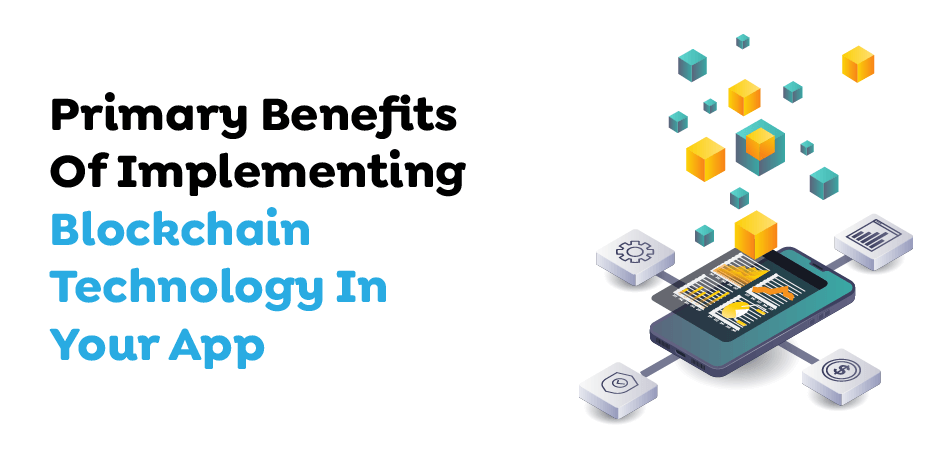
Benefits Of Blockchain Technology-
The brilliant technology does not have one but tens of benefits that it provides to individuals, integrating it into their everyday lives apart from security and transparency. There isn’t a field out there that innovative blockchain technology hasn’t transformed, from the healthcare industry to finance, by enhancing security by providing robust transparency to users during digital transactions. A brilliant blockchain mobile app development company can help you understand the benefits of integrating blockchain technology into your app.
1. Enhanced Security-
The prime and foremost benefit of the brilliant technology is robust security, as it doesn’t allow data alteration or deletion after it is entered.
2. Immutability–
Immutability refers to something that cannot be changed. In blockchain technology, a recorded transaction becomes a part of the blockchain; hence, it cannot be erased or altered. It is core to the integrity of data and protection from tampering actions; any change in the previous transactions would alter all the succeeding blocks, which is computationally impossible. In turn, this gives trust to immutability in ensuring an accurate and reliable history of transactions, which can be a secure foundation for several applications, among which are financial transactions and smart contracts.
3. Cryptographic Security-
Blockchain makes use of advanced cryptographic techniques to ensure robust data security. Each transaction is encrypted by complex algorithms, with each block connected to the previous one through cryptographic hashes. This forms a blockchain of information highly resistant to hacking and fraud. The security aspect of blockchain being decentralized enhances this part where data tampering would change all the subsequent blocks, which means altering all nodes is practically impossible. This cryptographic security ensures integrity and reliability in the blockchain.
4. Decentralisation–
Distribution of blockchain technology means distributing data over a network of interconnected computers called nodes. In this architecture, there is no central server or database that an attacker can attack, thereby eliminating a single point of failure. Each node has a copy of the blockchain, hence its resilience to attacks and reduced risk of data breaches. Also, if one of the nodes is compromised, the integrity of the whole network remains intact to ensure continuous and secure data maintenance in all nodes.
5. Increased Transparency-
Increased transparency is another benefit of the brilliant technology to help users keep track of their digital transactions in real time, thus ensuring accountability, reducing fraud, and enhancing trust in the system.
6. Auditability–
Auditability is probably one of the salient features blockchain technology provides through its inherent transparency. Any party in a transaction on the blockchain sees everything; this helps each independently verify and trace every transaction history. This clarity reinforces trust among the users since discrepancies or frauds are located and investigated effortlessly. Because one can audit transactions in real-time, thus ensuring accountability, Blockchain is a reliable system for maintaining accurate and tamper-proof records.
7. Traceability–
Because every single transaction is recorded, traceability in blockchain is one of its pivotal benefits. Each transaction is time-stamped and linked with the previous one to form a continuous, irreversible chain of records. This record-keeping at each stage provides a verifiable audit trail that assists in ascertaining the origin and movement of goods with a high degree of accuracy. This is particularly useful for traceability within supply chains and logistics in assuring authenticity, compliance, and transparency from beginning to end in product life cycles.
8. Improved Efficiency-
Smart contracts automate blockchain efficiency significantly, making it effortless. These self-executing contracts have their terms and conditions written directly into lines of code; hence, they automatically enforce and execute a pre-determined agreement between parties upon fulfilling the respective obligation. No intermediaries are required, and it does support processes that speed up transactions.
Apart from that, blockchain technology reduces intermediaries, operational costs and transaction fees, as it automates routine tasks. The results will, therefore, be a cheaper system that will cut down most administrative overheads, increasing the speed and reliability of transactions between different industries. Hire an iPhone mobile app development company or an Android mobile app development company, depending on your needs and budget, to turn your vision into a reality.
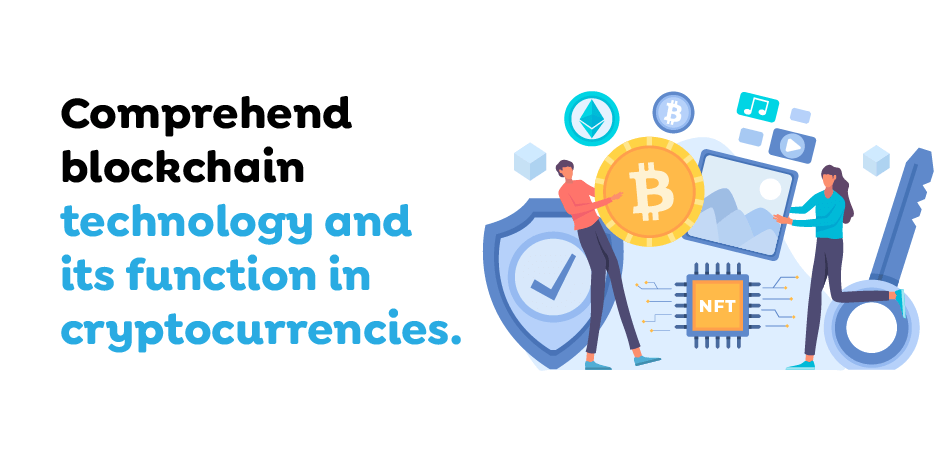
What Is Cryptocurrencies?
Cryptocurrencies, often known as virtual or digital currencies, are digital and employ encryption to prevent fraud and counterfeiting. Unlike traditional currencies issued by governments—fiat money—cryptocurrencies operate on decentralized networks based on blockchain technology, a distributed ledger in which transactions are recorded on computers. Hence, in this way, there will be no possibility for any single organization, be it a bank or the government, to hold centralized control over currency issuance, hence increasing transparency and safety.
The most famous cryptocurrency is Bitcoin, developed in 2009 by an anonymous person or group of persons under the alias Satoshi Nakamoto. This led to thousands more altcoins, like Ethereum, Ripple (XRP), and Litecoin to arise. Independent of this list, each cryptocurrency has its underlying technology that backs it for different ends, from peer-to-peer transactions to smart contracts.
They can buy goods and services as an investment or for cross-border value transfer. Essentially, this is the realm of lower transaction fees, improved security, and financial inclusion of unbanked people. However, cryptocurrencies are also known for their volatility and regulatory uncertainty, thus posing a risk to the investor and user.
What Is The Role Of Blockchain Technology In Cryptocurrency?
Blockchain technology represents the foundational framework underpinning cryptocurrencies, which provides a secure, decentralized system for transparently recording transactions. In cryptocurrency, blockchain technology acts as a distributed ledger where every single transaction is recorded on multiple nodes on computers in a network. Due to this approach, there isn’t a requirement to have the transaction processing intermediated by a third party, like banks, and these transactions are transparent and immutable, meaning they are irreversible once written.
The cryptographic techniques applied in blockchain technology enhance security since every transaction is verified with the consent of a consensus mechanism, such as proof-of-work or proof-of-stake. As a result, fraud and double-spending problems common in digital currencies can be prevented.
This blockchain transparency allows all the participants to view and verify the transactions in real-time. Consequently, this forms an atmosphere of trust and accountability. In addition, the efficiency of blockchain technology reduces transaction times and costs, thereby being very effective for global payments and remittances.
Industries That Integrate Blockchain Technology Apart From Cryptocurrency-
Apart from cryptocurrency, several other industries have integrated blockchain technology to reap the benefits of innovative technology, including robust security and transparency offered to users for their digital transactions.
1. Supply Chain Management [Healthcare]-
Blockchain technology has the potential and the willpower to leverage Supply Chain Management within the healthcare system in every possible manner to ensure the much-needed improvement in transparency, traceability, security, and product integrity, thus highlighting the importance of products in the healthcare supply chain, which must be integral and authentic. Blockchains are, above all, an immutable, decentralized record that guarantees integrity against any interference along the whole healthcare supply chain.
Transparency and traceability are possible with blockchain technology because everything becomes transparent along the chain in real time.
Manufacturing-to-distribution transactions and goods movements, from manufacturers to distributors to healthcare providers, are all recorded on blockchain technology, thus creating a transparent and traceable history of the product journey. This will be a key in the fight against counterfeit drugs, as they pose a real danger to patients’ lives.
-
Security and integrity of data:
In healthcare, sensitive data and precious items require safeguarding through cryptographic security, like in blockchain technology. One of the best advantages of blockchain technology in terms of information is that it is practically impossible to change information after it has been recorded. Since it is impossible to alter such information, medical supplies and drug information remain correct, reliable, and accurate. This retains a high level of quality for medical products and lessens the chances of fraud.
-
Increasing Efficiencies and Reducing Costs:
In this realm, blockchain technology may make the supply chain more efficient, reduce the number of intermediaries involved, and reduce manual processes. Smart contracts execute predefined actions as preconditions become valid and automate tasks like payment processing and inventory management, thus reducing administrative costs and delays.
Blockchain makes the supply chain more efficient, safe, and reliable. Because of the same reason, the health management system leads to better health outcomes.
1. Healthcare Industry-
Blockchain technology has transformed the healthcare industry by enhancing patient-centred treatment, security, and interoperability. In essence, blockchain technology is a decentralized, immutable ledger that ensures secure and transparent information management. This is immensely beneficial in health care, where sensitive patient information needs protection against breach and unauthorized access.
-
Enhanced Data Security
The encryption capabilities of blockchain technology are formidable for defence in cyberattacks. Each transaction is secured with cryptographic hashing and, in this way, bound to the previous one. Therefore, hackers can’t manipulate information without detection. It ensures integrity and patient information confidentiality in the case of such data breaches.
-
Improved Interoperability
Blockchain can finally make seamless data sharing across different healthcare providers, resulting in the consequent assurance that every patient’s records are effortlessly and flawlessly accessible by any authorized party.
This, in effect, will lessen difficulties in the coordination between doctors, hospitals, and insurance companies. Better diagnosis and treatment are made possible, for example, when several healthcare practitioners have safe access to a patient’s medical history.
-
Patient-Centric Care:
Since healthcare data is maintained on a blockchain, the patient has greater control over it. They can choose who has access to their information, thus enabling them to be in charge of their health record. Decentralization of data also makes it easier to acquire information about who is using it and why.
-
Prevention of Frauds and Efficient Billing
Blockchain makes billing and claim processing more seamless by reducing fraud and errors. Since all transactions are well recorded and verifiable because of the transparent nature of blockchain technology, incidences likely to occur will be low, thus reducing dispute cases and discrepancies in billing. Hence, an insurance process will be fair and relatively quicker.
Generally, it could disrupt the health and healthcare system by creating a safe, transparent, and efficient health ecosystem.
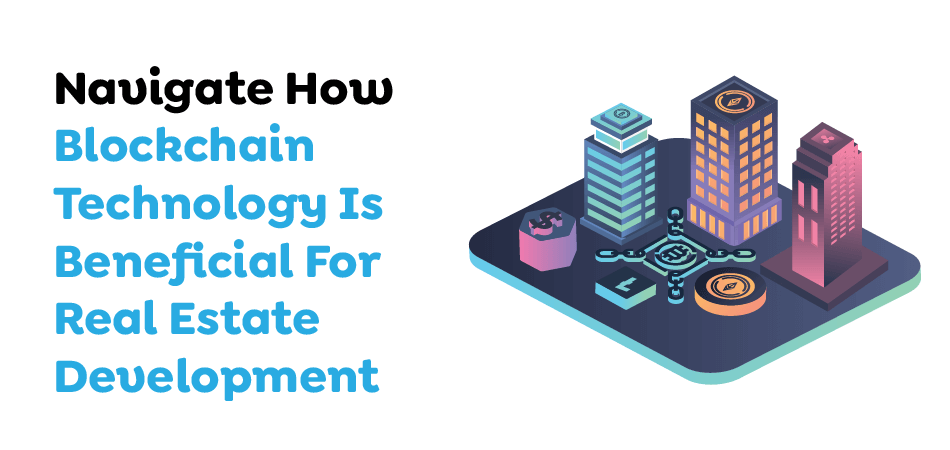
3. Real Estate-
Blockchain technology can drive several changes within the real estate sector, ushering transparency, efficiency, and safety into various procedures.
It improves transparency since blockchain technology is a decentralized ledger with all transactions recorded and cannot be changed. It denotes that each step of a real estate transaction—from listing a property to transferring title—is recorded permanently on the blockchain technology. This step thus ensures transparency and consequently reduces fraud risks, as all parties can access the same information in the block.
It eases transactions: Traditionally, a real estate transaction involves several people, including banks, brokers, and notaries—which results in a waste of time and money. Blockchain uses smart contracts that are self-executing contracts with terms written directly in the code. Smart contracts automate processes like payment, title transfer, escrow, and the like, thereby reducing the requirement for transaction intermediaries and speeding them up.
-
Improved Security:
Because of its decentralized nature, blockchain technology is more secure against hacking and fraud. Each transaction is recorded on several nodes, making it nearly impossible for the records to be altered or tampered with. It becomes crucial in the case of property titles, which can be fraudulently obtained easily under conventional procedures.
-
Tokenization of Real Estate:
Blockchain empowers the tokenization of real estate assets in that property ownership can be divided into digital tokens. This makes fractional ownership more accessible to a broader range of individuals, thus facilitating real estate investment. Additionally, on Internet platforms, it expedites and simplifies the buying or selling process of real estate shares.
Effective Property Management:
Blockchain can maintain records of rental agreements, maintenance, and interactions between tenants and landlords. Smart contracts can automate rent payments and the renewal of leases, thus simplifying property management.
In so doing, blockchain technology addresses inefficiencies and security concerns in the real estate sector, geared toward making it more open, accessible, and secure.
4. Charity And Non-Profits-
The game-changing power of blockchain technology lies in its capacity to exert transparency, effectiveness, and trust in the charity and non-profit sectors. The major problem charitable organizations face is the assurance of finances reaching pre-intended use. The transparent and immutable ledger of blockchain technology ensures that the donation or grant given can be recorded and the funds traceable from the donor to the final recipient.
This level of transparency eliminates the risk of corruption, fraudulent activities, or mismanagement that have often riddled charitable organizations. Donors can see where their money goes, delegating more trust to the organization.
Blockchain technology can make operations more efficient in terms of charity through representation with higher intermediaries. Peer-to-peer donations, lower overhead, and increased money reaching the right people are just a few of the ways blockchain technology might expedite this process.
In this case, smart contracts can automate processes of fund disbursements in tandem with the condition on which a donation is pegged, which avoids the cost headed to immaterial third parties and speeds up the process.
5. Voting Systems-
Blockchain technology can potentially increase transparency, security, and trust in the voting process. One of the most crucial advantages that blockchain technology can provide for voting is creating an immutable, distributed ledger. This eliminates the possibility of a vote being revoked, which addresses several issues related to election manipulation and fraud.
Another pivotal benefit is transparency.
With blockchain technology, all the processes for an election would be verifiable and auditable by all stakeholders: voters, candidates, and the electoral body. Each vote is recorded on an open ledger for people to see for transparency and verification of the process.
This technology can also help to protect the voter’s identity and secure their privacy. Cryptographic techniques used in blockchain technology can provide an extra layer of protection to the personal information of voters while at the same time allowing verification that a vote has been counted.
This, in turn, allows for a reduction of the risks associated with cyber-attacks. Unlike traditional ways of voting—in which servers are centralized—blockchain-based voting systems are decentralized. Therefore, it is difficult for hackers to compromise the whole system.
Further, blockchain technology can facilitate remote voting, whereby citizens will be allowed to vote from any part of the world securely. To ensure that their ability to contribute to democracy is not limited, this is important for citizens who live overseas or have difficulty moving about.
Overall, blockchain technology offers a promising solution to most of the challenges that traditional methods of voting face, thus opening up avenues for more secure, transparent, and accessible elections.
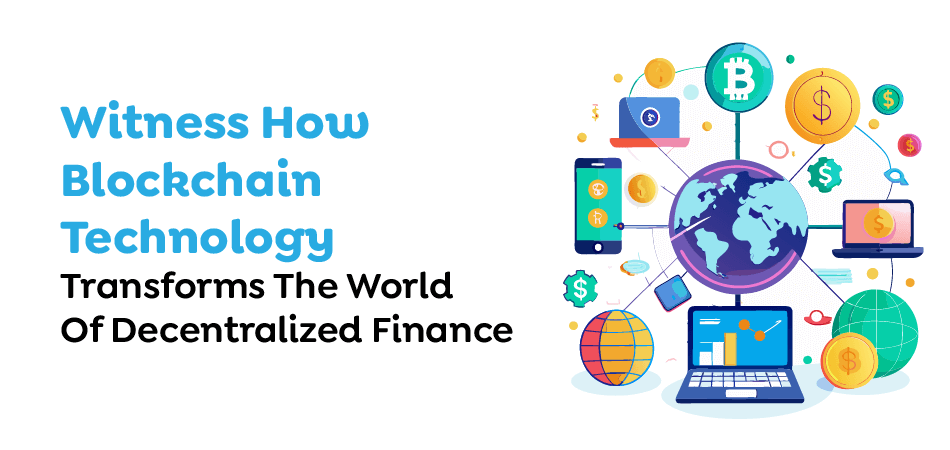
1. Decentralized Finance-
Blockchain technology is transforming the development and functionality of Decentralized Finance systems by offering a secure, transparent, and efficient financial infrastructure.
Security and Transparency:
Security and transparency are at the core of blockchains impact on DeFi. In essence, blockchains are decentralized ledgers that register all the transactions within a network of computers. Every transaction is verified by the network participants through specific consensus mechanisms, hence making it less prone to fraudulent activities since data is accurate and tamper-proof. It ensures transparency, thus allowing users to audit and confirm transactions by themselves, building trust throughout the system.
-
No More Intermediation:
The blockchain permits peer-to-peer transactions without needing an intermediary such as a bank or broker in finance. Smart contracts represent a computer protocol with the conditions of the agreement directly written into lines of code. It reduces the cost of intermediaries and improves speed in transaction processing time.
-
Accessibility and Inclusivity:
DeFi platforms are accessible to anyone with an internet connection, breaking down barriers for individuals underserved by traditional financial systems. Such inclusivity enables users from diverse geographical and socio-economic backgrounds to participate in monetary activities, including but not limited to lending, borrowing, and trading.
-
Financial Products Innovation:
This technology unlocked the development of new financial products and services, which include decentralized exchanges, yield farming, and liquidity pools. These open new avenues for independent users to derive a return on assets and portfolio management in a new, not centralized method.
In general, blockchain technologies form the basis of the DeFi ecosystem, underpinning improvements in security and cost reduction, increasing accessibility, and opening doors to innovation in the delivery of financial services.
Conclusion–
Therefore, significant consequences are formed in the field of mobile application development and other domains, given the disruptive potentials that blockchain has, which extend far beyond the sphere of cryptocurrencies.
As businesses and developers become more aware of the benefits of blockchain technology, it is becoming more and more common in mobile app development. This enhances security by making everything transparent, thus streamlining the processes and ensuring better creation of innovative and reliable mobile applications.
7 Pillars, a brilliant blockchain mobile app development company, can help you analyze the importance of integrating blockchain technology into your apps after understanding the market needs and your competitors.
A mobile app development company offers users more security due to its decentralized and tamper-proof nature. In particular, this will help applications that deal with sensitive information or financial transactions. Moreover, owing to its transparent ledger, blockchain enables users to trace and verify transactions to build trust and accountability. This is critical for apps driven by data integrity and user verification.
7 Pillars, a leading mobile app development company, can assist you in starting and planning your blockchain app on a budget. Our technocrats at 7 Pillars, a top blockchain mobile app development business, are skilled at using the newest technology in our clients’ software to improve operations, promote informed decision-making, and increase project efficiency.
If you want to launch a blockchain-integrated app, then look no further and contact our team at 7 Pillars, one of the top app development companies in the industry right now, to make your business venture dreams come true.



